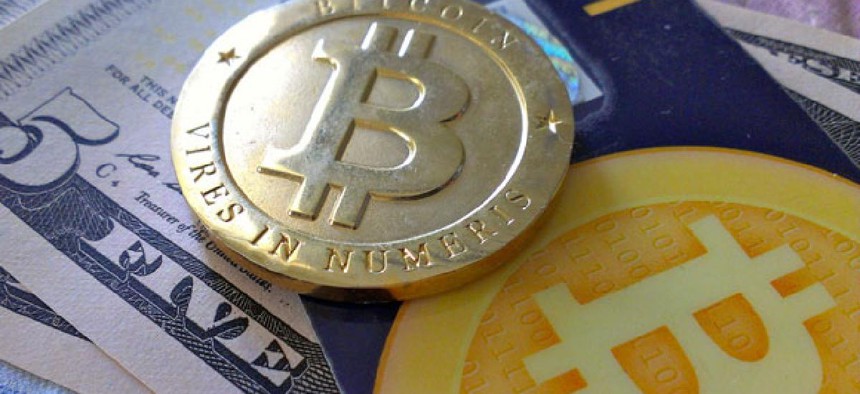What an Internet Sales Tax Could Mean for Your Bitcoin Stash

Flickr user zcopley
How will states collect taxes on bitcoin transactions if they're anonymous and untraceable?
If it passes the Senate in the next couple of days, as it’s expected to, a bill that would let states tax your online transactions will be one step closer to becoming law. The proposal’s been subject to an unusual battle that’s united liberals and conservatives while dividing big Internet companies. Amazon, for instance, supports the measur—partly because an Internet sales tax would hurt its smaller rivals. But the Senate bill, known as the Marketplace Fairness Act, could also unintentionally wind up serving an upstart of a different kind: Bitcoin, the much-discussed digital currency that some see as a rival to traditional cash or credit cards and others have dismissed as an impractical mashup of technology and money.
To understand what a trendy virtual currency has to do with the vagaries of sales taxes, we have to start with one of the main critiques of the Marketplace Fairness Act. States like the idea because it could bring in more than $23 billion in new tax revenues. What you pay at the point of sale, though, masks a more complicated set of machinery. Here’s Megan McArdle:
For Amazon—the actual target of these laws—this is trivial. Its staff of crack accountants can probably roll these things out before their Monday-morning coffee break. For a small vendor, however, that's a whole lot of paperwork. Imagine being a small eBay vendor that has to file a different set of tax returns every quarter or every month, depending on who happened to buy your handmade toaster cozies. The billmakes this slightly easier by exempting the smallest businesses and saying that you only have to file one return per state. But that's still hours and hours of work per month, for folks who are probably already working pretty damn hard.
“Anyone who has had to file income-tax returns in two states,” McArdle adds, “can imagine why you might not want to file in almost 50—monthly.”
And it’s not as if every state would charge the same sales tax; much like for physical transactions, different tax jurisdictions would be able to set their own rates. In short, where online sales taxes would be an annoyance to consumers who have to pay a little extra at checkout, they’d be a gigantic headache for small businesses.
If the Marketplace Fairness Act becomes law, it’s a good bet that somebody will tryto find a way around it. Humans are creatures of convenience, after all. And this is where bitcoins come in.
Bitcoins, by design, are anonymous. They can only be traded over the Internet, and aside from a recent decision by the Treasury Department, aren’t really regulated by anyone. They’re meant to be untraceable, which is why so much attention has been paid to the way they’ve propped up underground economies. But you can also buy legitimate goods and services with them. Put differently, a growing number of retailers are accepting bitcoins as a method of payment. They’re expensive to acquire -- at last count, they were valued at $156 each—but once you have them, you can use them however you wish without anyone being able to link your activity back to you.
This means that, conceivably, some online transactions would still be charged zero percent sales tax, despite the Marketplace Fairness Act, if they were conducted using bitcoins. Retailers like Amazon that charge sales tax already for certain jurisdictions calculate how much you (and they) owe based on your shipping address. Bitcoins aren’t associated with any address at all—that’s the whole point. Of course, if you pay for a book in bitcoins but have it shipped to your house, that’d make it easy to calculate the tax. But we regularly buy all sorts of digital goods now that don’t get shipped anywhere—music and software, to name two examples.
None of this is to suggest that bitcoin-based transactions are or should be exempt from online sales taxes—just that collecting them presents a new challenge. On the one hand, this could play out badly for Bitcoin if the ambiguity discourages retailers from adopting the tender. On the other hand, it also creates the possibility of a loophole. “Oops,” the businesses will tell the states. “We can’t collect this tax for you because the customer paid in bitcoins and we don’t know where he or she lives.”
Such a loophole would be a good reason for retailers and consumers alike to start flocking to bitcoins. It’s not clear what Congress could do to close the loop. If it tried, it would probably have to mention virtual currencies explicitly in the legislation, perhaps by setting a single national sales tax for all bitcoin-based purchases. Ironically, either outcome would likely help bitcoin gain, er, currency. Much as the Treasury Department cleared up legal uncertainty surrounding Bitcoin when it made its policy statement on it last month, a similar move by Congress would clarify things even more. That’d be a good thing for Bitcoin. As one widely read analysis of the currency has written, legal uncertainty has been one of the bigger obstacles to wider adoption.
This week, the currency took another step toward standardization when Web browsers were granted permission to support bitcoins universally. In the same way that clicking on an e-mail address automatically opens up your e-mail client, payment links have now been allowed, under HTML5, to automatically open up the virtual wallet that stores your bitcoins. Pretty neat. Like online sales taxes, this move on its own won’t cause Bitcoin suddenly to become a competitor to the dollar. But it’s one more step toward the currency becoming mainstream.
NEXT STORY: BYOD: Why managing devices is not enough





